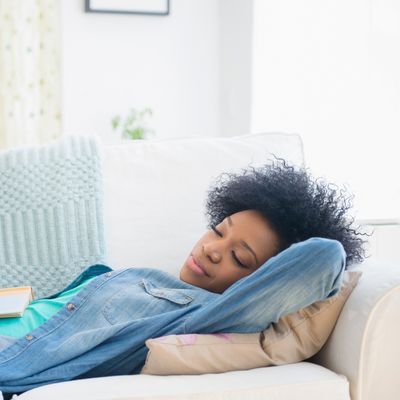
My dad and I have a long-running dispute over a simple question: How long should a nap be? To be fair, he should have the edge here. He’s a longtime napper, and fastidious about his rules: one 20-minute siesta every day, around 2 p.m., in a comfy lounge chair. Admittedly, I have less napping experience, though I, too, have a personal technique, which is to fully commit. I change into pajamas, close the curtains, and climb into bed for at least an hour.
My father is generally supportive of my life choices, but he very much disapproves of my naps. He believes that they’re too long, and thereby hurt my ability to fall asleep later that night, which will make me tired again the next day and continue the cycle. But I’ve found that if I lie down for any less than 60 minutes, I might as well not bother — I either wake up woozy and disoriented, or just don’t fall asleep at all.
The internet tends to side more with my dad, but the particulars are all over the place. A widely cited 1995 NASA study found that the “ideal” nap length is 26 minutes, after which test subjects’ “performance” (reaction time, memory) improved by 34 percent and “alertness” (feeling fresh and awake) improved by 54 percent. But a different study that compared naps lasting 5, 10, 20, and 30 minutes found that a 10-minute nap was the most “effective,” as it provided immediate improvements in “vigor” and cognitive performance for up to 155 minutes. In contrast, a 5-minute nap didn’t do much at all (does that even count as a nap?), whereas the benefits of a 20-minute nap took longer to emerge and lasted only 125 minutes. Interestingly, a 30-minute nap produced about the same benefits as a 10-minute one, but only after subjects managed to push through a period of post-snooze grogginess.
So … which is it? And what’s the real danger of napping for too little or too long? To get to the bottom of this, I called Rafael Pelayo, a sleep specialist at the Stanford Center for Sleep Sciences and Medicine. He explained that long naps can make you feel even more tired because, after about 40 minutes to an hour, your brain graduates to slow-wave sleep, a phase of deep rest that’s difficult to wake up from. “The transitional phase from being awake to being in a very deep sleep is known as intermediate sleep, and that’s where you want to keep your nap — usually about 20 to 40 minutes, and probably no longer than an hour,” he says. He used the term “sleep inertia”: If you think of sleep like a boulder rolling gently down a hill, you want to wake up before the boulder reaches full speed and is harder to stop.
Of course, the length of your “intermediate” sleep will vary from person to person, and is also affected by how sleep-deprived you are to begin with. Not to mention, most naps don’t begin as soon as you close your eyes. “We give a wide time window for the ideal nap because people don’t have a sleep switch that they can flip,” says Pelayo. “Also, most people aren’t really sleeping the whole time they’re napping — they’re kind of dozing in and out. And they need some time to relax before they can drop off. So, you might need to set aside an hour if you want 40 minutes of actual sleep.” Aha! Vindication: As a light sleeper, I spend the first 20-ish minutes of most naps just lying there — which puts my hour-long rest periods within the approved 20- to 40- minute sleep window.
As for whether my longish naps could hurt my ability to fall asleep at night … again, it depends. “I like to think of naps like snacks,” says Pelayo. “Just like you need to consume a certain amount of food every day, you need a certain amount of sleep, and that amount is usually pretty consistent — around eight hours for most of us. If you haven’t gotten your fill, it’s perfectly healthy and normal to make up for some of that deficit with a nap, if you can. But if you got nine hours of sleep, you probably don’t need a nap, just like you wouldn’t need a snack in addition to a big meal. You have to consider the circumstances.”
When I reported all of this to my dad, he explained that his main opposition to my naps is their “emergency” quality — that I tire myself out to the point that I “need” a full hour. As he put it, “I wish you didn’t have to nap out of exhaustion.” Which is a fair point. And very sweet of him.


